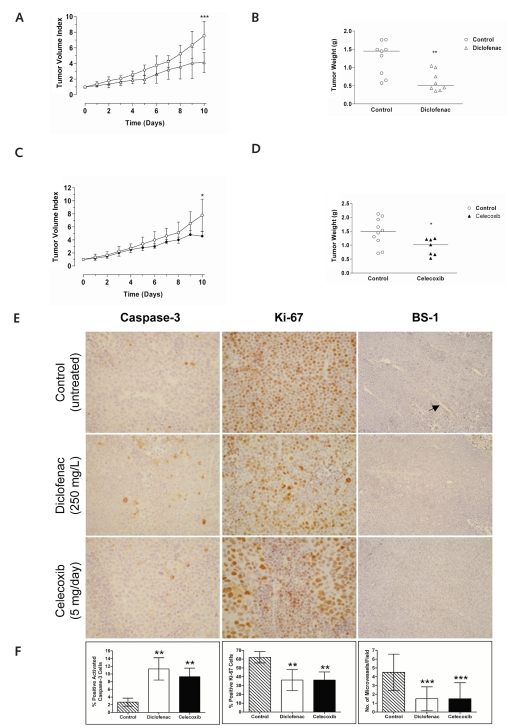Fig. 5.
Effects of cyclooxygenase (COX) inhibitors on established medulloblastoma (MB) xenografts in vivo. (A) Treatment of nude mice carrying D283 MED xenograft with 250 mg/liter diclofenac significantly inhibited tumor growth (mean ± SD). ***p <0.001. (B) Tumor weight of D283 MED xenografts from mice treated with 250 mg/liter diclofenac and untreated controls. **p < 0.01. (C) Treatment of nude mice carrying D283 MED xenograft with 2 mg celecoxib significantly inhibited tumor growth (mean ± SD). *p < 0.05. (D) Tumor weight of D283 MED xenografts from mice treated with 2 mg celecoxib and untreated controls. *p < 0.05. (E) Immunohistochemical analysis of tumor sections from D283 MED xenografts of nude mice receiving no treatment (control) or treated with diclofenac or celecoxib. Tissue sections from D283 MED xenografts were incubated with a monoclonal antibody detecting activated caspase-3 (left column; ×400 magnification). Proliferation was investigated using a specific antibody detecting the proliferation marker Ki-67 (middle column; ×400 magnification). Endothelial cells were stained using biotinylated Bandeiraea simplicifolia-1 (BS-1) lectin (right column; ×200 magnification). (F) Summary of the findings for caspase-3 activation, proliferative index, and microvessel density in tumors from nude mice treated with diclofenac or celecoxib (mean ± SE): cells staining positive for (left to right) activated caspase-3, Ki-67, and BS-1. Microvessel density was assessed by counting the number of microvessels at ×200 magnification in 16 fields that had the highest vascularization. **p < 0.01, ***p < 0.001.

